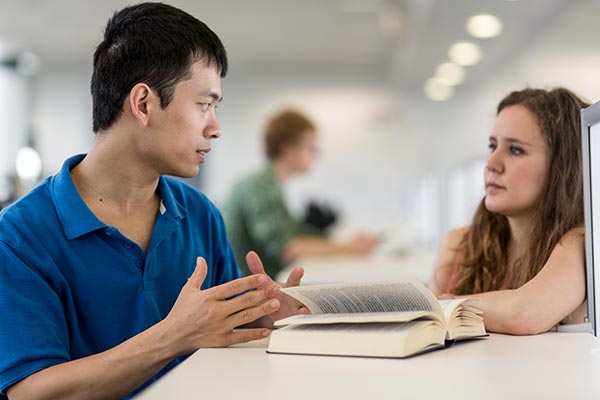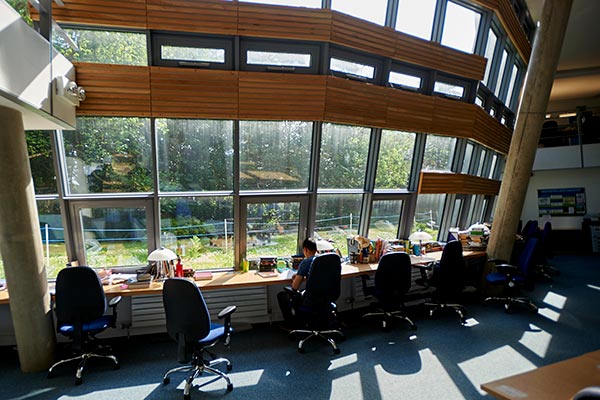
Explore text, history and theory in film and literature.
Year of entry: 2025 (September)
1 year full-time,
2 years part-time
September 2025 (semester dates)
Join us online or in person to find out more about postgraduate study at York.
Upcoming eventsEngage in a challenging, imaginative study of contemporary debates in film and literature; create and explore your own balance between these two fascinating fields of study.
The interdisciplinary MA in Film and Literature combines critical inquiry and independent research with passionately committed teaching from world-leading scholars. You can study high culture and pop culture, silent cinema and contemporary release; you can compare theoretical questions with creative practice, blockbuster with poetry, mainstream with avant-garde. The course explores critical, theoretical, and contextual approaches to film and literature, offering specialisations in global political film, documentary, Shakespeare on film, adaptation and transmediality, post-war and Cold War European and American film, as well as access to a full range of literary modules drawn from our MA programme as a whole.
The course will provide you with a foundation for doctoral research, and transferable skills for related careers in arts and festival management, teaching, publishing and journalism. There will be a diverse schedule of seminars, conferences and reading groups for you to attend as a member of the Department of English, one of the UK's largest research centres in modern English, as well as the Humanities Research Centre, a vibrant interdisciplinary hub which will enable you to form close social and intellectual bonds over the course of your study.
 The course is creative and engaging, and the tutors are always friendly and interested in what you have to say.Alex, MA Film and Literature
The course is creative and engaging, and the tutors are always friendly and interested in what you have to say.Alex, MA Film and Literature
for English Language and Literature in the QS World University Rankings by Subject, 2024
Complete University Guide 2025
The course examines the lively, symbiotic traffic between written word and cinematic image. You will examine films in their cultural, historical, industrial, technological and aesthetic contexts, and investigate key issues such as:
You'll study modules from a range of options offered by the Department of English and Related Literature and other arts and humanities departments. You'll also hone your research skills with dedicated training, and complete a research dissertation. You'll study 180 credits in total.
These modules present case studies of literature and film in the full diversity of their textual, contextual, historical and theoretical relationships. You'll be introduced to an illustrative range of interdisciplinary ‘encounters’, addressing film and literature as media with their own aesthetics and narrative codes; the social and institutional systems that facilitate (or impede) the transfer between them; the questions of style and creativity that sustain and inspire critical inquiry. You'll also develop valuable research, writing and presentation skills.
Your core modules will cover topics such as:
You will also study three option modules. Examples can be found below. Some option module combinations may not be possible. The options available to you will be confirmed after you begin your course.
Our modules may change to reflect the latest academic thinking and expertise of our staff, and in line with Department/School academic planning.
Your dissertation offers you the chance to examine a topic in depth and to develop your research skills. You will work on a 14,000-16,000-word dissertation with regular supervision from a member of staff.
You'll submit your dissertation at the end of your course. Recent dissertation topics include:
Every course at York is built on a distinctive set of learning outcomes. These will give you a clear understanding of what you will be able to accomplish at the end of the course and help you explain what you can offer employers. Our academics identify the knowledge, skills, and experiences you'll need upon graduation and then design the course to get you there.
| Study mode | UK (home) | International and EU |
|---|---|---|
| Full-time (1 year) | £11,200 | £25,900 |
| Part-time (2 years) This is the year 1 fee. Fees for future years are subject to confirmation. |
£5,600 | £12,950 |
Students on a Student Visa are not currently permitted to study part-time at York.
For courses which are longer than one year, the tuition fees quoted are for the first year of study.
UK (home) or international fees? The level of fee that you will be asked to pay depends on whether you're classed as a UK (home) or international student. Check your fee status.
Find out more information about tuition fees and how to pay them.
You will need copies of the texts set for each module. Where possible, the Department works to arrange digital copies via the University Library. Where this is not practical, you will be instructed in advance of the start of each term about the texts and editions you will need to purchase (whether new or second-hand).
Discover your funding options to help with tuition fees and living costs.
We'll confirm more funding opportunities for students joining us in 2025/26 throughout the year.
If you've successfully completed an undergraduate degree at York you could be eligible for a 10% Masters fee discount.
We are pleased to work with Chevening Scholars to offer funding for our Masters programmes. Chevening Scholarships provide one year of fully-funded postgraduate study in the UK for international (including EU) students. The scholarships are open to early and mid-career professionals who have the potential to become future leaders.
Further information about funding for English.
You can use our living costs guide to help plan your budget. It covers additional costs that are not included in your tuition fee such as expenses for accommodation and study materials.
You’ll work with world‐leading academics who’ll challenge you to think independently and excel in all that you do. Our approach to teaching will provide you with the knowledge, opportunities, and support you need to grow and succeed in a global workplace.
In the course of the year, we will expect you to give regular seminar presentations and to attend research seminars and day conferences hosted by the Department. Many of these events will be organised through the Humanities Research Centre, a state-of-the-art facility unique to York.
Writers at York is a lively programme of readings and workshops, and aims to celebrate and explore the work of both emerging and established contemporary writers.
Writers at York is supported by the University of York's External Engagement Awards and the Festival of Ideas.
You will be based in the Department of English and Related Literature on Campus West. Most of your contact hours will be in locations nearby on Campus West.
Our beautiful green campus offers a student-friendly setting in which to live and study, within easy reach of the action in the city centre. It's easy to get around campus - everything is within walking or pedalling distance, or you can always use the fast and frequent bus service.
You will submit an essay for each module of approximately 4,500 words. The Postgraduate Life in Practice module will be assessed on the completion of a series of tasks connected to your core work for the MA.


 The depth and breadth offered by the Film and Literature MA was very appealing; I'm really enjoying it so far. I think the interdisciplinary approach that York takes to its research is very exciting, and at the moment I am considering staying for a PhD!Tom, MA Film and Literature
The depth and breadth offered by the Film and Literature MA was very appealing; I'm really enjoying it so far. I think the interdisciplinary approach that York takes to its research is very exciting, and at the moment I am considering staying for a PhD!Tom, MA Film and Literature
Our postgraduates go into a wide variety of industries, from arts administration to law. Many alumni have also gone on to become successful novelists, poets and playwrights.
The course will help you to develop a range of transferable skills including:
| Typical offer | |
|---|---|
| Undergraduate degree | 2:2 or equivalent. We will consider applications from students with lower qualifications, particularly if you have high marks in relevant modules or appropriate professional experience. |
| Other international qualifications | Equivalent qualifications from your country |
You will need to submit examples of written work with your application. Please see our guidance on submitting written work.
If English isn't your first language you may need to provide evidence of your English language ability. We accept the following qualifications:
| Minimum requirement | |
|---|---|
| IELTS (Academic and Indicator) | 6.5, minimum 6.0 in each component |
| Cambridge CEFR | B2 First: 176, with 169 in each component |
| Oxford ELLT | 7, minimum of 6 in each component |
| Duolingo | 120, minimum 105 in all other components |
| LanguageCert SELT | B2 with 33/50 in each component |
| LanguageCert Academic | 70 with a minimum of 65 in each component |
| Kaplan Test of English Language | 459-494, with 426-458 in all other components |
| Skills for English | B2: Merit overall, with Pass with Merit in each component |
| PTE Academic | 61, minimum 55 in each component |
| TOEFL | 87, minimum of 21 in each component |
| Trinity ISE III | Merit in all requirements |
For more information see our postgraduate English language requirements.
You may be eligible for one of our pre-sessional English language courses. These courses will provide you with the level of English needed to meet the conditions of your offer.
The length of course you need to take depends on your current English language test scores and how much you need to improve to reach our English language requirements.
After you've accepted your offer to study at York, we'll confirm which pre-sessional course you should apply to via You@York.
Get in touch if you have any questions

Find out more about all of our English MA courses.

We offer a range of campus accommodation to suit you and your budget, from economy to premium.

Explore campus and city life and hear what our current students have to say about living here.

Lively, full of culture and beautiful, York is regularly voted one of the best places to live and visit in the UK.

Find out more about York. Chat to staff and students and take the tour, on campus or online.